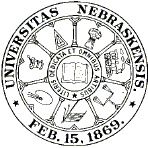
University Studies (University of Nebraska) (1888–1984)
Date of this Version
7-1905
Citation
UNIVERSITY STUDIES, Vol. v, No. 3, July 1905.
Abstract
The Breton Club having ceased its activity after the discussion of the veto in August, 1789, the popular party in the assembly found itself without a railying point. Although differences of opinion had shattered the loosely organized club at Versailles, the memory of its usefulness soon induced the same members to attempt the formation of a new and more regularly organized association in the capital,1 The exact date of the formation of the J acobin Club it is impossible to determine from the evidence so far discovered, but everything points to the close of November or the first days of December, 1789, as the period during which the· first meetings were helJ. From a letter of Boulle, deputy of Pontivy, dated December 18, we learn that the society had recently been formed but had existed long enough to have received numerous requests for correspondence from provincial societies.
This new organization adopted the name of "Society of the Revolution" which it soon changed to "The Society of the Friends of the Constitution." The name "Jacobin" was unofficial before September 21, 1792, and was given it by the public who knew it as the society which met in the Jacobin convent. A formal constitution or reglement was voted on February 8, 1790, entrance cards and initiation fees required, and persons not members of the National Assembly freely admitted. Preparation for the debates in the National Assembly, which had been practically the sole object of the Breton Club, was only one of the objects of the new society. Its aim was nothing less than the conversion of the whole of France to the support of the revolution. It was the center of an enormous propaganda, with secondary centers in all the principal cities of the kingdom, and soon spreading into the villages and even the country districts. Three large standing committees were appointed, meeting on fixed dates as deliberating bodies. These were the committees on membership, correspondence, and administration. The Jacobin Club is not to be regarded as a party in the usual sense of the term, for it was not composed of men holding the same views upon the questions of the hour. Its members were not required to subscribe to any specific political faith. They promised merely to uphold the revolution as it had been or was still to be expressed in the 'work of the National Assembly.l This by no means implied that all its members were necessarily satisfied with the solution of every question so far treated by the assembly, but that as a matter of policy they acquiesced. Difference of opinion was often as violently expressed in the club as in the assembly. It is equally miseading to use the terms "Jacobin" and "revolutionary" as synonymous. as Ferrieres so frequently,does,2 for the society never contained all the deputies in sympathy with the revolution and it certainly was not responsible for the whole revolution. It was by such loose terminology that the enemies of the club attempted to render it responsible for every radical measure or popular disturbance.

